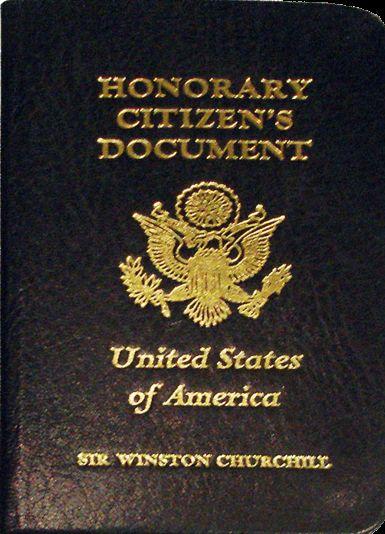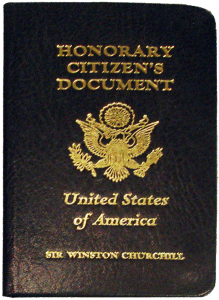
Senior Statesman
Churchill Honored with US Citizenship

May 29, 2009
by John Plumpton

ON APRIL 9th, 1963, a deeply moved Sir Winston Churchill, sitting in his London home with his wife beside him, watched a satellite relay of a White House ceremony giving him honorary US citizenship. It had been hoped that he would not only witness the event by TV but would also he able to respond. However, the relay station at Goonhilly, Cornwall, was not ready to transmit and it was decided not to request French help for this special Anglo-American occasion.
In Washington, several hundred guests, including Averell Harriman, Dean Acheson and three sons of Franklin Roosevelt, gathered in the White House Rose Garden. A very special guest was 92-year old Bernard Baruch, a close friend of Sir Winston’s. Observing from a window and recovering from a stroke was the American President’s father, Joseph Kennedy, a former Ambassador to Great Britain and opponent of American involvement in the war. The Churchill family was represented by his son Randolph Churchill and grandson, Winston.

2024 International Churchill Conference
Sir Winston was to share a distinction held only by the Marquis de LaFayette. But it was the first time that Congress had actually resolved that honorary citizenship he bestowed, by the President of the United States, on a foreign national. LaFayette had local citizenry conferred on him by Maryland and Virginia when the colonies became the Union in 1788. Like all other citizens of those states, he then became a citizen of the newly-created United States of America. Churchill, by contrast, had been granted honorary citizenship of eight states: Hawaii, Maryland, Nebraska, New Hampshire, North Carolina, Tennessee, Texas and West Virginia.
President John F. Kennedy praised Sir Winston as a defender of freedom, wartime leader, orator, historian, statesman, and Englishman. The President’s opening remarks gave eternity the classic tribute to one of Sir Winston’s greatest achievements: “He mobilized the English language and sent it into battle.” [See Kennedy’s remarks]
THE PROCLAMATION
Whereas Sir Winston Churchill. a son of America though a subject of Britain, has been throughout his life a firm and steadfast friend of the American people and the American nation; and
Whereas he has freely offered his hand and his faith in days of adversity as well as triumph; and
Whereas his bravery, charity and valor, both in war and in peace, have been a flame of inspiration in freedom’s darkest hour; and
Whereas his life has shown that no adversary can overcome, and no fear can deter, free men in the defense of their freedom; and
Whereas he has expressed with unsurpassed power and splendor the aspirations of peoples everywhere for dignity and freedom; and
Whereas he has by his art as an historian and his judgment as a statesman made the past the servant of the future;
Now, therefore, I, John F. Kennedy, President of the United States of America, under the authority contained in the act of the 88th Congress, do hereby declare Sir Winston Churchill an honorary citizen of the United States of America.
In witness whereof, I have hereunto set my hand and caused the Seal of the United States of America to be affixed.
Done at the City of Washington this ninth day of April, in the year of our Lord nineteen hundred and sixty-three, and of the in-dependence of the United States of America the one hundred and eighty-seventh.
After Sir David Ormsby Gore, the British Ambassador to the United States, thanked the President, Randolph Churchill, in a voice many thought reminiscent of his father’s, stepped forward to read Sir Winston’s response:
Mr. President, I have been informed by Mr. David Bruce that it is your intention to sign a bill conferring upon me honorary citizenship of the United States.
I have received many kindnesses from the United States of America, but the honour which you now accord me is without parallel I accept it with deep gratitude and affection.
I am also most sensible of the warm-hearted action of the individual states who accorded me the great compliment of their own honorary citizenships as a prelude to this act of Congress.
It is a remarkable comment on our affairs that the former Prime Minister of a great sovereign state should thus be received as an honorary citizen of another. I say “great sovereign state” with design and emphasis, for I reject the view that Britain and the Commonwealth should now be relegated to a tame, and minor role in the world. Our past is the key to our future, which I firmly trust and believe will be no less fertile and glorious. Let no man underrate our energies, our potentialities and our abiding power for good.
I am, as you know, half American by blood, and the story of my association with that mighty and benevolent nation goes back nearly ninety years to the day of my father’s marriage. In this century of storm and tragedy, I contemplate with high satisfaction the constant factor of the interwoven and upward progress of our peoples. Our comradeship and our brotherhood in war were unexampled. We stood together, and because of that fact the free world now stands. Nor has our partnership any exclusive nature; the Atlantic community is a dream that can well be fulfilled to the detriment of none and to the enduring benefit and honour of the great democracies.
Mr. President, your action illuminates the theme of unity of the English-speaking peoples, to which I have devoted a large part of my life. I would ask you to accept yourself, and to convey to both Houses of Congress, and through them to the American people, my solemn and heartfelt thanks for this unique distinction, which will always be proudly remembered by my descendants. –Winston S. Churchill
The official Proclamation was delivered by American Ambassador to Britain David Bruce and Secretary of Defense Robert McNamara personally took a passport-sized copy of the Presidential proclamation for delivery to Sir Winston who was leaving shortly for the French Riviera.
The British House of Commons celebrated the event in a motion, tabled by members of all three parties:
“That this House congratulates the Rt. Ron. Member for Woodford upon the unique honour of honorary citizenship conferred upon him by the President and Legislature of the United States of America; and places on record its deep appreciation of the sentiments which prompted this historical enactment.”
Thus closed another chapter in the history of the English-speaking peoples.
Subscribe
WANT MORE?
Get the Churchill Bulletin delivered to your inbox once a month.


